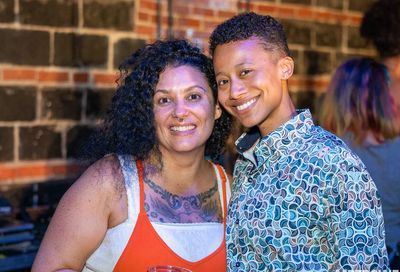Texas Jury Rules Gay Couple Had A “Common Law” Marriage
Jury's verdict paves way for couple to divorce, and allows one partner to be eligible for alimony and other spousal benefits.

Last week, a San Antonio jury returned a verdict in favor of a gay man who sought to prove he had been in a common law marriage since 1996, and is thus entitled to alimony and other marital benefits even as he and his partner separate.
While various judges have ruled that same-sex marriages, or their equivalent, existed prior to the Supreme Court’s 2015 decision in Obergefell v. Hodges, which ruled all existing laws prohibiting same-sex marriage in the United States to be unconstitutional, last week’s decision marks the first time a jury in Texas has made such a finding with regard to a divorce action.
The plaintiff, Christopher Hoffman, filed for divorce from his former partner, Moises Ortiz, in 2019, claiming that although the two had not legally wed, they had been involved in a common law marriage for more than 20 years.
Hoffman’s lawyers claimed the two were married based on how the Texas Family Code defines common law marriages, while Ortiz’s lawyers argued that no such marital arrangement existed, and that he and Hoffman were “simply roommates that acted as partners.”
In a pre-trial hearing on July 30, 2019, Judge Mary Lou Alvarez, of the 45th District Court of Bexar Count, found that Ortiz’s claim that he and Hoffman were just roommates to be “incredulous testimony,” according to Out in SA.
As a result, Alvarez issued a temporary order requiring Ortiz — the primary wage-earner in the relationship — pay Hoffman $1,200 a month for interim spousal support until a jury could determine whether indeed the two had been part of a common law marriage.
Justin Nichols, an attorney for Hoffman from the San Antonio-based Nichols Law Firm, told Metro Weekly in an interview that proving a common law marriage can be difficult, and even many of the jurors were initially confused about what constituted a common law marriage, believing that it required living together for a set amount of time. But in Texas, there is no minimum or maximum time limit.
“A common law marriage is two people who agree to be married, they live together as spouses and they hold themselves out or represent themselves to others as married,” said Nichols. “The purpose is, and Texas recognizes, that many people, for whatever reasons, get into long-term relationships and consider themselves married, and the protections that marriage comes with formally should also apply to those people who have gotten the piece of paper saying they’re married.”
At trial, Hoffman’s attorneys offered evidence and witness testimony attesting to the fact that their client and Ortiz had worn matching gold rings throughout their relationship, represented themselves as married to friends and family, owned property together, and shared an apartment that was featured in a San Antonio Express-News article mentioning both their names.
“For the longest time, we’ve incessantly talked about the right to marry. And really, the right to marry includes the right to divorce, and we explained this to the jury,” Nichols told Metro Weekly. “For many years, until Obergefell, the way gay people split up from their relationships was they just went their separate ways — what’s yours is yours, and what was in my name is mine, and you were out of luck if you were not the more powerful or more leveraged partner.
“But divorce laws across the nation, including Texas, protect partners from that happening, and give the parties the right to have what they built together, divided in a fair and equitable way.”
The four-day trial was held in the 285th District Court of Bexar County, with Judge Aaron Haas presiding. The jury ultimately determined, by a 10-2 vote, that Hoffman and Ortiz had been involved in a common law marriage, finding that the couple was married on February 14, 1996, and that grounds existed for the court to grant a divorce.
Nichols says that the jury verdict entitles Hoffman to Social Security benefits, based on Ortiz’s much higher salary, long-term spousal benefits through Ortiz’s retirement plan with the San Antonio Independent School District, and spousal support, or alimony, from Ortiz, which is important because Hoffman has since become disabled and can no longer work.
With the jury having ruled in Hoffman’s favor, a judge will now decide how the couple’s assets will be divided and will issue a final decree of divorce, which will not be stayed, meaning it would take effect immediately.
Nichols said that although he expects Ortiz’s lawyers to appeal the decision to the Court of Appeals in San Antonio, and potentially up to the Texas Supreme Court, he does not expect the state to interfere. While Texas Attorney General Ken Paxton has tried to limit the impact of the Obergefell case, he has not yet gotten involved in the case.
“We anticipate the state might make a claim or file a brief once the decision is appealed. But he has no binding decision-making power,” Nichols said of Paxton. “He can give his opinion, and he likes to do that. But it doesn’t necessarily mean they’ll be ruling on anything.”
Nichols noted that the decision in favor of Hoffman could have implications for other gay couples across Texas seeking to have their common law marriages recognized.
“One man and one woman voted against us,” Nichols said of his post-trial conversations with jurors to determine how they had voted and what had swayed their decision-making.
“Interestingly, there were two people on the panel who said they did not believe in gay marriage. And both of them voted for us. The two that didn’t, their main reason was, ‘Why didn’t they get married formally after [the] Obergefell [Supreme Court decision] came down?’ And our response was, ‘They didn’t have to, because they were already married,'” Nichols said.
“In all respects, they had a marriage, it was just they could now get a special piece of paper saying it. But to them, they didn’t need the piece of paper, because Obergefell didn’t drastically change their relationship. That’s not what formed a marriage. And that’s why we have common law marriage in Texas.”
Nichols also said that speaking to the two jurors opposed to same-sex marriage who eventually sided with Hoffman was “one of the more satisfying points” of his personal and professional life.
“I probably gave the best damn closing argument I’ve ever given in my life,” he said. “I was able to demonstrate that through all the ups and downs…the reason [Hoffman and Ortiz] stayed [together] was they vowed to stay together for better or for worse, for richer or poorer, in sickness and in health, and all those things apply in this particular case. They stuck it out because they committed to do that with each other, and that’s what we call marriage.
“Both jurors said they had never thought of it that way. They both said they were on the fence until the very end, but that description, that explanation, led them to say ‘What these people had was real.'”
Support Metro Weekly’s Journalism
These are challenging times for news organizations. And yet it’s crucial we stay active and provide vital resources and information to both our local readers and the world. So won’t you please take a moment and consider supporting Metro Weekly with a membership? For as little as $5 a month, you can help ensure Metro Weekly magazine and MetroWeekly.com remain free, viable resources as we provide the best, most diverse, culturally-resonant LGBTQ coverage in both the D.C. region and around the world. Memberships come with exclusive perks and discounts, your own personal digital delivery of each week’s magazine (and an archive), access to our Member's Lounge when it launches this fall, and exclusive members-only items like Metro Weekly Membership Mugs and Tote Bags! Check out all our membership levels here and please join us today!





























You must be logged in to post a comment.